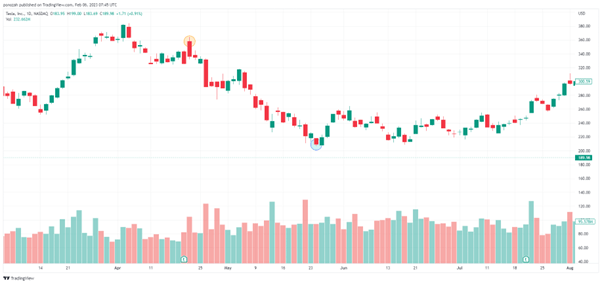What is short selling?

Short selling is an investment or trading strategy based on speculation, and it involves selling a security or stock that a trader does not own. A trader believes the stock or security price would decline in the future, thus borrows from a broker or dealer, and sells that stock on the open market, hoping to buy it back at cheaper prices in the future.

Apart from being used for speculative purposes, short selling can also be a valuable tool for hedging purposes. As a hedging tool, this strategy allows a trader to protect their portfolio (long positions) against downside risk and minimizes losses due to a decline in their own securities.
Short-Selling using Derivatives
Derivatives are securities whose value depends on or derives from one or more underlying assets. Derivatives are financial contracts between two parties and can be derived from different asset classes such as stocks, bonds, market indexes, commodities and even currencies.Short-selling, using derivatives, can be used for a speculative purpose and as a hedging tool.
For hedging purposes, if a trader is bearish towards the security they already own, they may hedge their position by purchasing a derivative product that would increase their overall portfolio even if the stock price eventually decreases as anticipated.
There are several methods the trader can use to hedge their long positions using derivatives, dependent on what type of derivative is used, such as:
- Futures: The trader may enter a short position in a futures contract if they believe the asset price will fall.
- Forwards: Forwards are the same as the futures, does would also need to take the same position. The only defining feature of forwards against futures is that futures are traded over Over-the-Counter (OTC), and their contract sizes are not standardized.
- Options: The trader can take a short position on a put option on the trader’s underlying asset that they speculate will go down in value and hedge their portfolio against downside losses.

What are the Advantages and Disadvantages of Short Selling?
Advantages:
- Potential for Huge Profits: The main advantage of short selling is the possibility of huge profits that can be made with correct speculation on any particular stock or security.
- Creation of liquidity in the Market: Short sellers provide liquidity for buyers within the stock market, which helps the stock market function efficiently.
- Hedging of Long Positions: As mentioned previously, short selling can hedge long positions and offset some of the risks of investing.
Disadvantages:
- Potential for Unlimited Losses: One of the significant disadvantages of the strategy of short selling is the unlimited downward risk the trader faces. If the forecasted movement is incorrect, and the stock price goes up instead of down, the trader would have to cover the additional amount above what they had shorted the stock. Theoretically, the stock price can rise to infinite. Thus, the amount of loss is also unlimited.
- Gives rise to the need to spread False Information: Some short sellers can spread false information in the market to drive down the share price of a particular company they have taken a short position on to drive up their profit when they buy back the stock.
- Betting against the market: The stock market tends to go up over time (not considering any unpredictable shocks or crisis that may occur), so this strategy faces a position that it will be tough to make a profit in the long run.
- Short squeeze: A stock may experience a short squeeze, where the stock’s price rises rapidly, which would force short sellers to buy those shares at high prices to close their position, which in turn pushes the stock price even higher.

Summary
No other strategy has been as controversial in the market as the short-selling practice. Some participants in the market praise the practice of strengthening the market by exposing which securities are overpriced. In their search for overpriced securities, short sellers can uncover questionable practices within companies and expose fraud. While some participants frown upon it as they believe it is unethical to bet against and profit from a company’s failure and that this practice can turn a market dip into a full-blown market crash.No matter your view towards this particular practice, this is an advanced strategy best suited to be left to advanced traders who may be more familiar with the risk and regulations involved.
Sources: Investopedia, Bankrate
Comments
No comments
Leave a comment
Your Email Address Will Not Be Published.
Related articles
Home
Trive
TriveHub
TriveHub, where financial empowerment begins.
Explore our comprehensive financial education platform, where market insights, expert guidance, and premium content come together to shape your investment journey. Whether it's stocks, currencies, or cryptocurrencies that pique your interest, we provide the knowledge you need to make informed decisions.
All financial products traded on margin carry a high degree of risk to your capital. They are not suited to all investors, and you can lose more than your initial deposit. Please ensure that you fully understand the risks involved and seek independent advice if necessary. For further information, please see our full Risk Disclosure, Terms of Business, and Privacy Policy.
We use cookies to support features like login and allow trusted media partners to analyze aggregated site usage. Keep cookies enabled to enjoy the full site experience. By browsing our site with cookies enabled, you are agreeing to their use. Review our cookie information for more details.
This website (trivehub.com) belongs to Trive International, and it is the registered trademark of Trive International Ltd. Trive International Ltd. is authorized and regulated by the British Virgin Islands’ financial authority, named Financial Services Commission (“FSC BVI"), under the company number 1728826 and license number BVI SIBA/L/14/1066.





0 comments